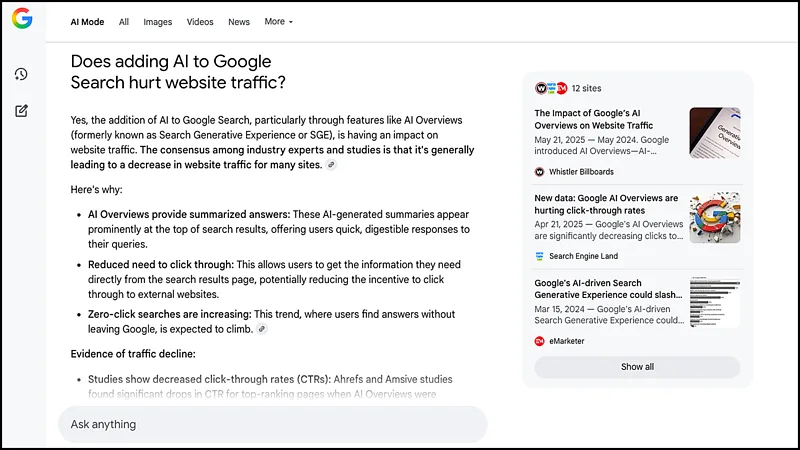As Google rolls out its latest AI-powered tools across its search engine, a fierce debate is unfolding: is this the next chapter in digital innovation — or the beginning of the end for the open web?
At the heart of this transformation is AI Mode, a new search feature designed to give users fast, synthesized answers directly within search results. No more scrolling through pages of links. No more hopping from one website to another. Just ask a question, and Google’s AI gives you a polished answer — instantly.
To some, this seems like a leap forward. To others, it’s a warning sign that Google’s dominance over the internet is becoming too powerful, potentially cutting off the lifeline that has sustained online publishing for decades.
The Web’s Original Deal: Links for Traffic
For nearly 30 years, the internet has run on a simple, silent agreement: websites provide free content, Google indexes it, and in return, Google sends users — who click links, view ads, and support those content creators.
Roughly 68% of all online activity begins with a search engine. Of that, Google owns a staggering 90% of the search market. If the internet is a digital ecosystem, then Google has long acted as the sun, nourishing websites with traffic.
But AI Mode changes everything.
AI Mode Isn’t Just a Feature — It’s a Takeover
Unveiled by Google CEO Sundar Pichai in May 2025, AI Mode is an evolution of AI Overviews, the brief, generated responses already appearing at the top of many search results. But this time, it’s more than a summary — it’s a full AI-driven experience that can replace traditional search results entirely.
“It’s a total reimagining of Search,” Pichai announced. Google’s head of Search, Liz Reid, added:
“This is the future of Google Search.”
While it’s currently optional in the U.S., experts believe it’s only a matter of time before AI Mode becomes the default — and that could devastate the existing web economy.
Publishers Are Bracing for Impact
Lily Ray, SEO strategist at Amsive, puts it bluntly:
“If AI Mode becomes the default, it will severely cut into revenue for most publishers.”
Why? Because AI Overviews already reduce click-through rates — the number of users who visit a website after seeing it in search results. Studies suggest clicks have dropped by 30–70% depending on the query, and that over 60% of Google searches now end without a single click.
Barry Adams, founder of SEO agency Polemic Digital, predicts:
“Click-throughs from Google’s AI Mode may fall by half. That could be the tipping point between profitability and collapse for many digital publishers.”
The Disappearing Web Experience
But the problem isn’t just about revenue — it’s about access.
Gisele Navarro, managing editor of HouseFresh, likens the new AI-driven experience to a library that no longer lends books:
“It’s like asking a librarian for a book, and they just describe it instead of giving it to you.”
She warns that the rich, diverse community of independent voices online could fade away as fewer users explore beyond AI-generated responses.
“The web is made of communities. That could disappear.”

Google Defends Its AI Evolution
Google, unsurprisingly, rejects this doom-and-gloom outlook.
Nick Fox, Google’s SVP of Knowledge and Information, says:
“From our point of view, the web is thriving. No company cares more about its future than Google.”
Fox points to a 45% growth in high-quality web content (excluding spam) over the past two years. He also claims that AI features like Overviews and Mode help users ask better questions and still lead to high-quality engagement with websites.
But so far, Google has not released concrete data showing how AI Mode affects publisher traffic. And many feel that’s a red flag.
Who Really Controls the Web?
Navarro sees something deeper at play:
“Google wrote the rules, built the infrastructure, and rewarded the players. Now it’s changing the rules — and acting like it owns the web.”
As Google centralizes more user activity within its own ecosystem, critics argue that it’s eroding the open web — the very foundation of free and independent digital content.
What Happens Next?
For now, AI Mode is in its early stages. But if it expands globally — and becomes the default search method — the internet as we know it may shift dramatically.
Will it improve how we find information? Or will it centralize power and silence countless smaller voices online?
One thing is certain: the next chapter of the web will be written — or perhaps generated — by artificial intelligence.

